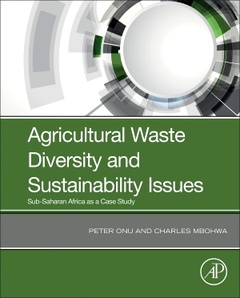Description
Agricultural Waste Diversity and Sustainability Issues
Sub-Saharan Africa as a Case Study
Authors: Onu Peter, Mbohwa Charles
Language: English
Subjects for Agricultural Waste Diversity and Sustainability Issues:
204 p. · 19x23.3 cm · Paperback
Description
/li>Contents
/li>Biography
/li>Comment
/li>
Agricultural Waste Diversity and Sustainability Issues: Sub Saharan Africa as Case Study presents solutions for overcoming limitations, guiding developmental processes, and improving knowledge transfer in agricultural waste management and development. The book gives considerable attention to treatment and conversion, with best management practices involving the reduction and elimination of waste volume in its various forms, sectors and streams. Sections cover waste management in the agriculture and food sector, including methodological approaches in waste preparation and processes, the most important energy generation techniques and strategies, and best practices, management, sustainability, associated technologies, accountability, communications, and involvement surrounding diverse stakeholders.
Agricultural Waste Diversity and Sustainability Issues: Sub Saharan Africa as Case Study illustrates the use of mathematical models to minimize operational cost in agro-waste management processes and discusses the application of eco-efficiency. Ultimately, the book focuses on the prospect of agro-wastes management and risk associated in the sub-Saharan African region, including Nigeria, Uganda, and South Africa as case studies.
1. Waste management and the prospect of biodegradable wastes from agricultural2. Agricultural wastes and opportunities from food production chain3. Methodological approaches in agro-waste preparation and processes4. Sustainable agricultural wastes diversity: advances in green energy and material production5. Sustainable agro-wastes diversity versus sustainable development goals6. New approach and future aspects of agro-wastes resources conversion for energy systems performance and development7. Overview of models for agricultural waste management, and trends for global energy solutions8. Nascent technologies in resources conservation and sustainable agricultural development9. Which way forward, agro-waste development, and the fourth industrial revolution appraisal10. Economics and risk assessment of new technologies in agro-waste diversity11. Conclusion and perspectives
Professor Charles Mbohwa is a Professor in the Faculty of Engineering and the Built Environment. He is currently Acting Executive Dean, Faculty of Engineering and the Built Environment at the University of Johannesburg and is an established researcher and professor in the field of sustainability engineering and energy. Upon graduating with his BSc Honours in Mechanical Engineering from the University of Zimbabwe in 1986, he was employed as a mechanical engineer by the National Railways of Zimbabwe. He holds a Masters in Operations Management and Manufacturing Systems from University of Nottingham and completed his doctoral studies at Tokyo Metropolitan Institute of Technology in Japan. He was a Fulbright Scholar visiting the Supply Chain and Logistics Institute at the School of Industrial and Systems Engineering, Georgia Institute of Technology, a Japan Foundation Fellow, is a Fellow of the Zimbabwean Institution of Engineers and is a registered mechanical engineer with the Engineering Council of Zimbabwe. He has also visited many countries on research and training engagements including the United Kingdom, Japan, German, France, the USA, Brazil, Sweden, Ghana, Nigeria, Kenya, Tanzania, Malawi, Mauritius, Austria, the Netherlands, Uganda, Namibia and Australia. He has had several awards including British Council Scholarship, Japanese Foundation Fellowship, Kubota Foundation Fellowship; Fulbright Fellowship.
- Captures a solutions-based assessment that redresses the challenges created by a poor biodiversity strategy in Sub-Saharan Africa to meet present needs in SSA and around the world
- Provides foundational information for agricultural diversity, food waste elimination, clean energy production, and technology emergence
- Enables a greater understanding of the state-of-the-art approach for effective biodegradable waste management
- Inspires further research into sustainable and cost-effective biowaste operations, wastes management models, methodologies for utilization and nascent technologies that are capable of bolstering clean energy generation




